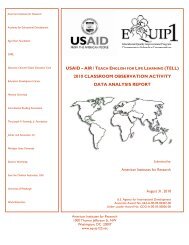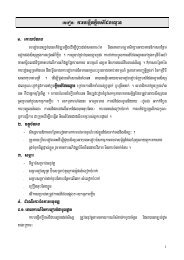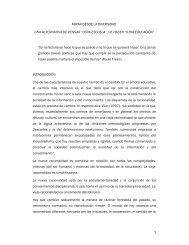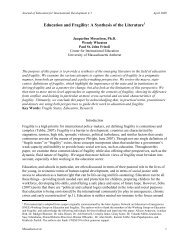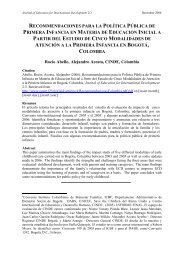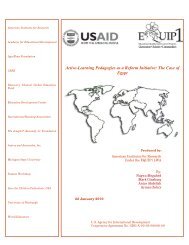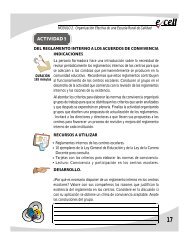The Power of Persistence: Education System ... - EQUIP123.net
The Power of Persistence: Education System ... - EQUIP123.net
The Power of Persistence: Education System ... - EQUIP123.net
Create successful ePaper yourself
Turn your PDF publications into a flip-book with our unique Google optimized e-Paper software.
decentralization <strong>of</strong> the social sectors, which underlay most <strong>of</strong> major initiatives<br />
that took place during the 1990s and was a departure from the centralized<br />
management system in place under the Sandinistas.<br />
<strong>The</strong> MINED has adopted a new education vision. After the reelection in 2007,<br />
the FLSN has taken on issues <strong>of</strong> equity as a main platform. <strong>The</strong> administration’s<br />
criticism <strong>of</strong> the decentralization-based reforms are related to the inequities<br />
experienced by poorer families by the imposition <strong>of</strong> school fees, an element <strong>of</strong><br />
the autonomous schools (Gershberg, 2002). <strong>The</strong> aim <strong>of</strong> the current government is<br />
thus to re-centralize education (Porta and Laguna, 2007).<br />
Strategies<br />
<strong>The</strong> main education reform was Belli’s Autonomia Escolar (Autonomous Schools<br />
Program or ASP), which sought to transfer the management <strong>of</strong> schools from<br />
the central Ministry <strong>of</strong> <strong>Education</strong> to the local level (Fuller and Rivarola, 1998).<br />
This main effort was coupled with a Transformación Curricular, a curriculum<br />
reform designed to eliminate the Sandinista revolutionary ideas and images and<br />
institute a morals and values component (AED, 1998). In addition, efforts were<br />
made to bring the Ministry <strong>of</strong> <strong>Education</strong> up-to-date, increasing the efficiency <strong>of</strong><br />
its operations through updating s<strong>of</strong>tware and creating databases for accessing<br />
information available to central and local level Ministry <strong>of</strong> <strong>Education</strong> <strong>of</strong>fices.<br />
When the MECD launched the ASP in 1993, garnering much international<br />
support from the World Bank and other donors, there was no institutional support<br />
or legal framework that outlined the MECD’s goals and visions for education, or<br />
the ways that reforms should take shape. <strong>The</strong> main proponent in many ways for<br />
the ASP, Belli, wanted to increase the efficiency <strong>of</strong> the education system, and make<br />
it more accountable to parents and communities. Later, local buy-in and donor<br />
support reinforced the direction toward decentralization although programs<br />
expanded to include instructional quality reforms and teacher capacity building,<br />
and bilingual education for the Atlantic Coast (AED, 1998; USAID, 2005).<br />
Transferring all powers <strong>of</strong> school management over to school-based governing<br />
councils, ASP is considered “one <strong>of</strong> the most radical educational decentralization<br />
experiments in Latin America” (Gershberg, 1999). School-based councils<br />
became responsible for the daily functioning <strong>of</strong> the school institution, including<br />
decisions regarding how to use the fiscal transfers made to the school by the<br />
central ministry, the hiring and firing <strong>of</strong> teachers, and the curriculum (Fuller and<br />
Rivarola, 1998). It was meant to empower parents and community members with<br />
respect to education, thus making the system more accountable to local levels, and<br />
thus increasing the efficiency and quality <strong>of</strong> the system (Fuller and Rivarola, 1998).<br />
100<br />
SECTION 2: lESSONS fROM COUNTRY CASE STUdIES



